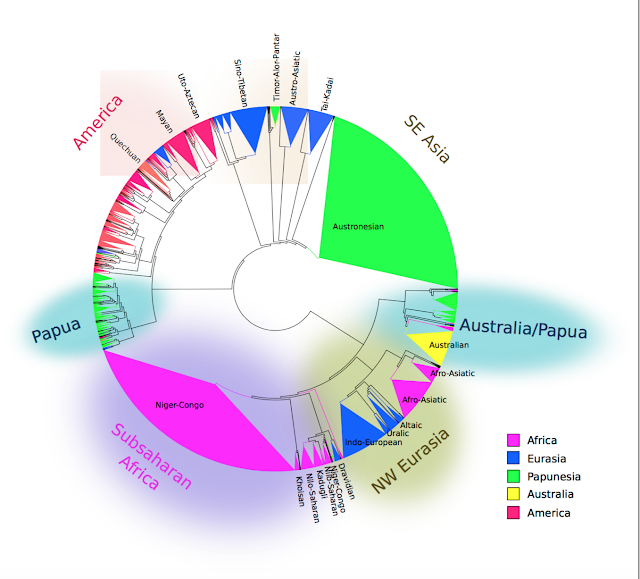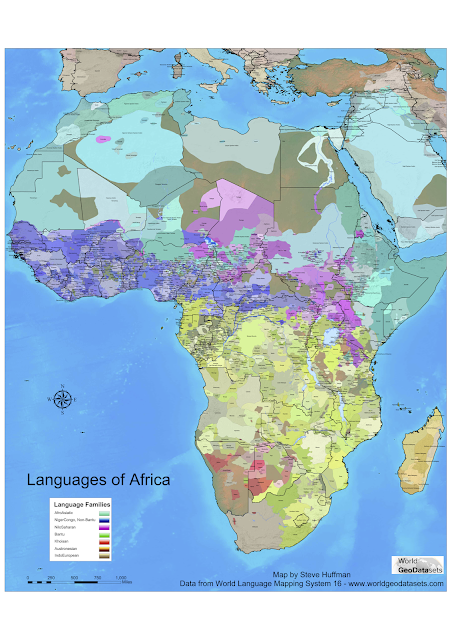Authors
After a year of reading grammars of African languages, Suzanne is now working on getting her MA degree in Linguistics from Leiden University. Her main interests are linguistic typology and descriptive linguistics, in the broadest sense.
suzannevdmeer-AT-gmail.com
First language: Nederlands
Hedvig Skirgård
 Hedvig is Swedish and has a name that never fails to generate a mention of the great works of JK Rowling. It is actually a compound of two Germanic roots, both meaning "war/battle". This means that a ‘Hedvig’ is someone who fights, a valkyria/shieldmaiden. This is something she likes to point out in a very serious manner when the owl is brought up for the nth time.
Hedvig is Swedish and has a name that never fails to generate a mention of the great works of JK Rowling. It is actually a compound of two Germanic roots, both meaning "war/battle". This means that a ‘Hedvig’ is someone who fights, a valkyria/shieldmaiden. This is something she likes to point out in a very serious manner when the owl is brought up for the nth time.
She did her MA in General linguistics at Stockholm University and is interested in grammatical typology, contact linguistics and linguistic complexity. She used to work at the MPI Nijmegen on a grammatical survey of African languages. She is currently a PhD student at ANU in Canberra, Australia. You can read more about the project she's in here. She also has a web page here and can be reached at hedvig.public {snabel-a} gmail.com.
First language: Swedish
For Hedvig's posts click here.
Nik RolleFirst language: Swedish
For Hedvig's posts click here.
 Nik is a PhD student at the University of California, Berkeley, who is very interested in the syntax and phonology of West African languages, especially those of Southern Nigeria. He claims Prussian ancestry, grew up in the Rust Belt of America, compulsively collects vinyl records, and likes to bike. A lot.
Nik is a PhD student at the University of California, Berkeley, who is very interested in the syntax and phonology of West African languages, especially those of Southern Nigeria. He claims Prussian ancestry, grew up in the Rust Belt of America, compulsively collects vinyl records, and likes to bike. A lot.
He finished his M.A at the University of Toronto, presenting an analysis of Esan subject markers as referential pronouns. Find him at n.rolle-AT-berkeley.edu.
First language: English
First language: English
Jeremy Collins no information up yet
Siva is a PhD student at Northumbria University and visitor at the ANU. He works on describing grammar in terms of information structure, as well as on developing computational methods for historical linguistics (non-treelike representations of language families) and typology (automated language sampling).
He enjoys rederiving his name (and others’) into different branches of Indo-European, even though Vedic śiváḥ may not be of Indo-European origin.
First language: spoken Tamil
Dominant language (age 4 onwards): English
You can find Siva's posts here.
He enjoys rederiving his name (and others’) into different branches of Indo-European, even though Vedic śiváḥ may not be of Indo-European origin.
First language: spoken Tamil
Dominant language (age 4 onwards): English
You can find Siva's posts here.
Jesse Stewart
Jesse enjoys writing about himself in third person and wishes he had more time to blog. He also wishes he knew more about typology, but, luckily for him, everyone else on this blog seems to have him covered. In his free time he's probably procrastinating from work. His musings can be found here.
First language: English
 Annemarie Verkerk
Annemarie Verkerk Annemarie did her PhD at the MPI in Nijmegen, and is currently a postdoc at the University of Reading. She originally fell in love with linguistics during a lecture by Leon Stassen on Altaic in 2004, and has enjoyed reading grammars more or less since. She has a website here.
First language: Nederlands
You can find Annemarie's posts here.
Hilário de Sousa
Hilário studied linguistics at Auckland and Sydney, and has since had a number of postdocs in Europe. He wrote a reference grammar of Menggwa Dla (Papuan), and is in the process of renewing the Menggwa Dla reference grammar, and writing a reference grammar of Nanning Pinghua (Sinitic). Both are under-documented and disappearing. One is spoken on both sides of a sometimes-politically-unstable border, where there is no road/ navigable river/ electricity/ running water/ internet/ mobile phone coverage, and the other is spoken in a place with underground trains and high-speed rail.
He has too many interests within linguistics. His views on morpho-syntax are mostly functional-typological oriented, and he is also interested in various formal phonological theories. Another things that he enjoys is semantic typology.






Comments
Post a Comment